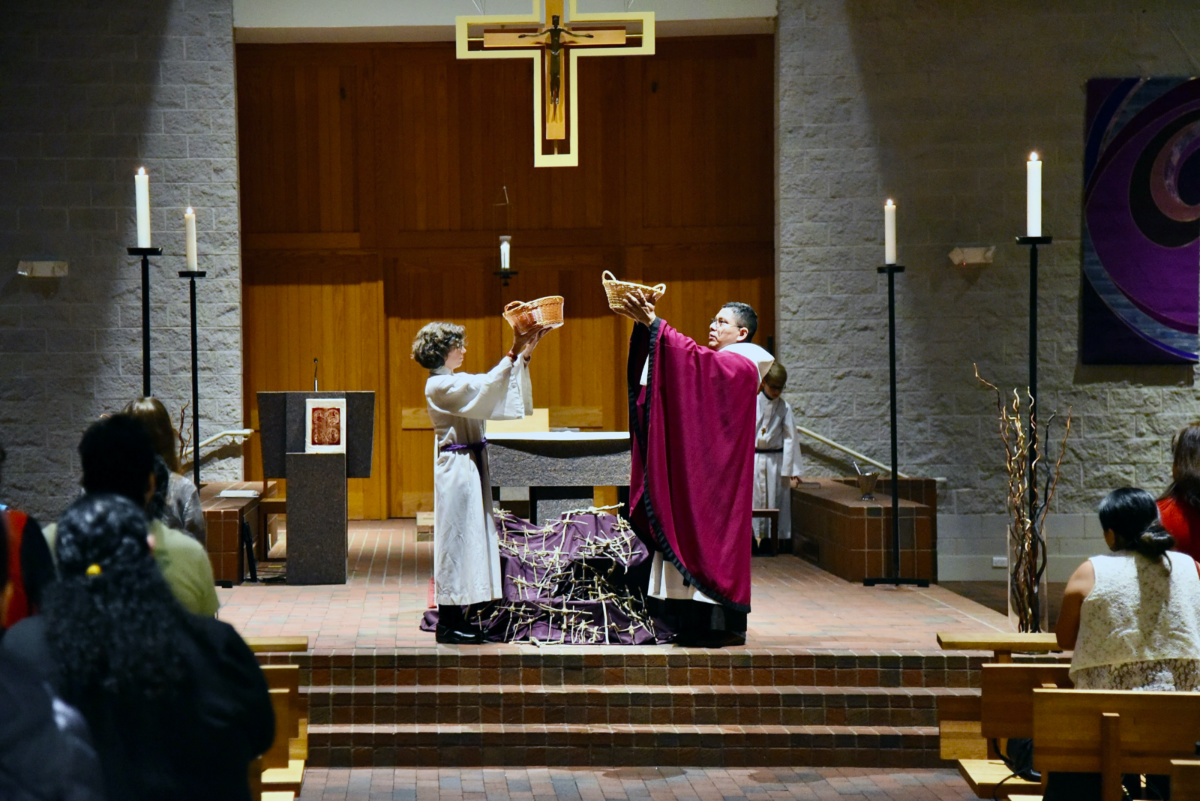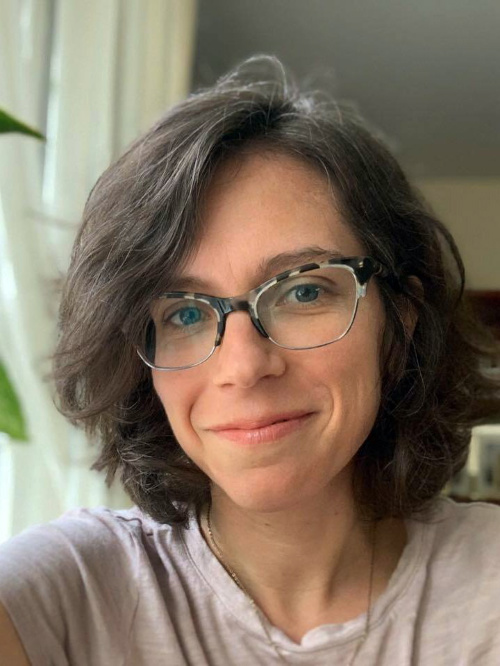Casey Stanton wanted to offer encouragement, love and healing to the inmates at the North Carolina Correctional Institution for Women, where she served as a chaplain intern a few years ago.
But as a Catholic woman she could not represent her church there in any official capacity.
The state of North Carolina requires chaplains in its state prison system to be ordained. And the Catholic Church does not ordain women – neither as priests, nor as deacons.

Casey Stanton, left, and Rev Mario Gomez raise up the prayers people have written down at the culmination of a three night parish retreat at Immaculate Conception Parish in Durham, North Carolina, in March, 2020. PICTURE: John Witchger
Stanton, who is 35 and holds a master of divinity from Duke Divinity School, is not seeking to become a priest, which canon law forbids. She would, however, jump at the chance to be ordained a deacon – a position that would allow her and other women to serve as Catholic chaplains in prisons, hospitals and other settings.
“I’d like to be able to represent the church in these places where I feel like we’re called to go,” Stanton said.
She tried the Veterans Affairs hospital next. But there too, she found a similar obstacle to full-time chaplaincy.
“I thought I could find some workaround,” she said. Instead, she added, Catholic chaplaincy “felt like a dead-end.”
In April, Stanton co-founded Discerning Deacons, an organisation that urges conversation in the Catholic Church around ordaining women deacons. Stanton hopes it might add to ongoing efforts on multiple continents to restore women to the ordained diaconate, which the church in its early centuries allowed.

Casey Stanton. PICTURE: Courtesy photo
On Monday, a new commission set up by Pope Francis to study women in the diaconate began meeting for one week in Rome. It is the fourth group since the 1970s to discuss ordaining women deacons, and many are hoping they will release their recommendations publicly so the church can lay the groundwork for restoring the order.
Francis has repeatedly called for a greater female presence in church leadership, and while he has continued church teachings against women priests, he changed church law to allow women to be installed as lectors and acolytes.
Up until the 12th century, the Catholic Church ordained women deacons, although by then their service was mostly restricted to women’s monasteries. Some Orthodox churches that split from the Catholic Church in the 11th century still do. In the New Testament Book of Romans, the Apostle Paul introduces Phoebe as a “deacon of the church at Cenchreae.” He also names Priscilla and Junia and several other women leaders.
In the 1960s, the Second Vatican Council reinstated the role of deacon for men. (It had previously reserved the diaconate as a transitional ministry for men studying to be priests) but not for women.
Partly due to the shortage of priests, there is growing momentum to restore women to the diaconate. At the 2019 Synod of Bishops for the Pan-Amazon region, a large number of bishops requested the permanent diaconate for women. Many are now hoping the next synod, which will culminate in Rome in 2023, will take up the issue again.
“If the church expresses its need, the Holy Father would have an easier time restoring women deacons,” said Phyllis Zagano, senior research associate-in-residence at Hofstra University in Hempstead, New York, and the foremost expert on women deacons in the Catholic Church.
The work of the deacon as defined by canon law is to minister to the people of God in word, liturgy and charity. Though not a paid position in most instances, it does require a person to undergo a course of study and a laying on of hands through ordination.
“Typically, the deacon manages the charity on behalf of the bishop or pastor in any given parish. That would include managing the food bank, taking care of the poor, visiting the sick,” said Zagano.
Deacons may also proclaim the Gospel, preach, witness marriages, baptize and conduct funeral services. They cannot lead a Mass, consecrate the Eucharist or hear confessions.
The Center for Applied Research in the Apostolate estimates there are about 19,000 male deacons in the United States today, a one per cent drop from last year. Formation programs for deacons reported a two per cent drop in enrollments. Perhaps most troubling, the share of deacon candidates in their 30s and 40s has declined to 22 per cent in 2020, down from 44 per cent in 2002, a June report found.
In some parts of the country, Catholic laywomen are already serving as administrators in lieu of priests, often as parish life coordinators, but without ordination.
“Right now, when you are a woman serving in any capacity, there’s often a cloud of suspicion hanging over your work, the sense that your work would be better done by a man or a priest,” said Anna Nussbaum Keating, a Catholic writer living in Colorado who supports restoring the diaconate for women. “There’s a sense she is inferior or maybe she’s there because she wants to change the church, versus understanding that there have always been women in ministry in the church and that their contributions are holy and valid and good.”
The coronavirus, which has killed more than 650,000 Americans, has only accentuated the need for more Catholic hospital chaplains as people died alone and without the comfort of a priest or a deacon during their final days.
On 3rd September, the feast day of St Phoebe, the group Discerning Deacons held a Zoom prayer service celebrating the legacy of the 1st-century saint with some 500 women from across the world. It included videotaped stories of women who were passionately called to serve the church and hurt by their inability to do so formally.
Documentary filmmakers Pilar Timpane and Andrea Patiño Contreras have filmed Called to Serve about some of the US women now pushing the church for ordination as deacons. A longer documentary, with producer Christine Delp, is now in the works.
“We’re looking at the needs of the church today,” said Stanton, who lives in Durham, North Carolina. “Might including women in this order help further the church’s mission in the world?”





